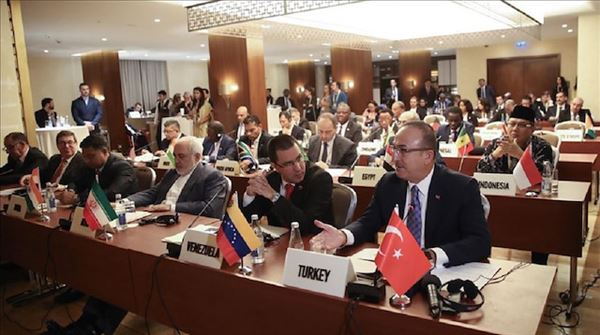ANKARA (AA) - As many as two dozen heads of state and governments have arrived in Baku on Thursday, the capital of Azerbaijan, to attend a two-day sum
ANKARA (AA) – As many as two dozen heads of state and governments have arrived in Baku on Thursday, the capital of Azerbaijan, to attend a two-day summit of the Non-Aligned Movement (NAM) summit.
The 18th forum of the 120-member group covering 55% of the world’s population is expected to discuss responses to contemporary challenges around the world, at a time when the relevance of the NAM in the post-Cold War era is under question.
Turkish Foreign Minister Mevlut Cavusoglu is representing his country at the summit.
“Turkey has been closely following the developments within the Non-Aligned Movement and participates in the high-level meetings of the Movement as a guest country since 2006,” the Turkish Foreign Ministry said in a statement.
Soon after his arrival in Baku, Cavusoglu attended the meeting of the NAM’s Ministerial Committee on Palestine. He is expected to hold bilateral meetings with counterparts over the next two days.
Since becoming a NAM member in May 2011, Azerbaijan is hosting the summit for the first time. Among other government heads, Malaysian Prime Minister Mahathir Mohamad is addressing the meeting. Pakistani President Arif Alvi, Iranian President Hassan Rouhani, Bangladesh Prime Minister Sheikh Hasina and Nepal Premier K.P. Sharma Oli have also arrived in Baku to attend the summit, Azerbaijani media reported.
Quoting Malaysian Foreign Minister Saifuddin Abdullah, Kuala Lumpur-based English daily The Strait Times reported that Mahathir during his address would stress the importance for the organization remaining neutral and respecting its founding principles.
The first summit of the NAM was held in Belgrade, now the capital of Serbia, in 1961, with the participation of 29 countries. They were committed to keeping their foreign policy non-aligned and not participating in military and political blocs. They also stressed the need for peaceful coexistence based on the principles of independence and equality.
– Ideology of Cold War not relevant
Among the founding members of the NAM, India on Thursday called for reform in the organization. Indian Foreign Minister S. Jaishankar told the ministerial meeting that the long-held assumption and alignments rooted in the legacies of colonialism and the ideology of the Cold War were not relevant in current times.
Indian Vice-President M. Venkaiah Naidu is representing the country at the summit, as Prime Minister Narendra Modi will miss the summit a second time in a row. In 2016, India was represented by then Vice-President Hamid Ansari at the NAM summit in Venezuela.
“The world today has moved on from what the NAM founding leaders faced in Bandung in 1955. The scales of global geo-political balance have shifted, and continue to do so, propelled by forces of globalization and transformational technological progress,” said Jaishankar.
Pointing out that multilateralism was under strain, India’s foreign minister said countries are now more interconnected and interdependent than ever before.
“It is important that our Movement that represents two thirds of the world’s population – continues to work together and take the lead in building multilateral governance structures that are capable of meeting these challenges,” said Jaishankar.
He also noted that terrorism was the single biggest threat not only to international peace and security, but also to development. “No cause justifies the indiscriminate killing of innocents as a means of achieving a political goal. The growing linkages between terrorist groups and cross-border operations including terror-financing networks, and the spread of hateful ideologies through modern communication technologies have left no country untouched by this scourge,” he added.
Some experts suggest NAM should reboot its activities in order to remain relevant. Member countries possess 75% of the world’s oil reserves and 50% of its gas fields, besides huge human resources.
Senior Azerbaijani journalist Aslan Aslanov said NAM members had a chance at the Baku summit to reclaim significance for the forum. Aslanov, who is also president of the Organization of Asia-Pacific News Agencies (OANA), said there was a need to put the NAM’s potential to sensible and rational use in order to transform it into a powerful political force that could influence world developments.
